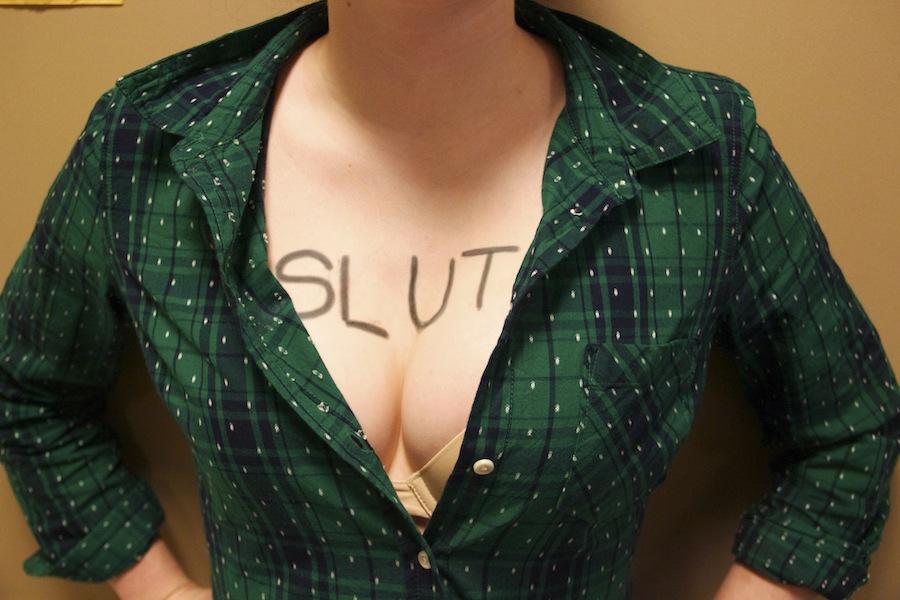Shamed
Women who violate traditional expectations of dress and sexual experience often face ridicule for their choices
October 6, 2014
Michael* likes Sarah*. Sarah’s friend Emma* likes Michael and becomes jealous. Emma tells Michael a rumor about Sarah’s sexual past.
Even though Michael was interested in Sarah, he calls her a slut and refuses to talk to her anymore.
This is an anonymous Park student’s experience with slut shaming, and she’s not the only one.
Nina Jonson is the Community Education Manager and External Relations Coordinator at myHealth for Teens & Young Adults, a non-profit clinic and educational organization in Hopkins.
She defined slut shaming as anything intended to make a woman feel ashamed or guilty about her sexual life.
“I feel like the definition [of slut shaming], the one that is universally understood, is making a young woman feel bad about her [sexual choices],” Jonson said.
Jonson also said slut shaming has to do with what people wear and how they carry themselves.
Author and feminist advocate Jaclyn Friedman said she thinks slut shaming is less about someone’s perceived sex life and more about punishing the woman.
“It’s a tool to keep women in line on the assumption that if you were being sexual it would be bad,” Friedman said.
Jonson said she thinks teenagers perceive being slutty as the worst possible accusation and because of that, it’s leveled at girls in order to assert power over them by the shamer.
“If they’re trying to keep a person down for whatever reason, that’s the word they’ll use,” Jonson said. “If she’s too outspoken, if she doesn’t agree, if she doesn’t go with the status quo, if she’s an independent individual.”
Junior Aerianna Thomas said she sees slut shaming as a problem at Park. She said people use slut shaming as an attack against people they don’t like.
“A lot of people … dress a certain way even though there’s a lot of people that dress the same way,” Thomas said. “They’ll pick out certain people and call them a slut.”
Thomas also said she has been offhandedly slut shamed in the past and thinks it’s a general perception of all women.
Freshman Benjamin Castellanos said he believes there aren’t obvious instances of slut shaming at Park but it’s not a myth.
“I don’t think it’s not a problem [just] because I don’t see it happening,” Castellanos said.
In an anonymous interview, a student described her experiences with slut shaming and bullying.
“One of the most common experiences is that people just call me [a slut],” she said. “But I’ve definitely had worse. People are really mean.”
She also said she gets dirty looks and comments on things she’s wearing and her real or presumed sexual activity.
“People have actually come up to me and told me that having sex is wrong,” she said. “Even my parents have called me a whore for clothing I’m wearing. My mom has straight up said that I look like a prostitute.”
She said some of the worst experiences she’s had are when people tell her they don’t respect her and no one will ever want to marry her.
“I had a guy say that I will never be able to date someone, because I’m too slutty and [no one] wants a used up slut,” she said. “They tell me how I need to stop having so much sex, because it’s going to ruin my reputation and I will never get respect.”
Health teacher Allison Luskey said she believes there is a double standard when judging girls’ sexual choices as opposed to judging boys’ choices.
“Someone may dress a certain way and they’re looked down on because they look more sexual,” Luskey said. “Males really don’t have that criticism that they’re dressed too sexually.”
Luskey said this double standard is unfair, especially since it’s based on flash judgments, appearance and perceived sexual history.
Luskey also said slut shaming often has more to do with reputation than the person’s actual sexual activities.
According to Jonson, slut shaming can be responsible for many problems. From a teen health perspective, it causes hesitancy in teenage girls to seek out the medical care they may need.
“People are worried about even going to a clinic and being seen at a clinic, [like] ‘what will somebody say about me if I was there’,” Jonson said. “That can cause young women to take more risks with their sexual health.”
According to Jonson, girls who are pressured into believing that having sex will damage their reputation, won’t take precautionary actions such as obtaining birth control and or sexually transmitted infection testing. This makes slut shaming not only demeaning, but dangerous as well.
Because of the vulnerability of teenagers and the environment created in high schools, it makes slut shaming very effective, Friedman said.
“When you’re older and you’re more centered about what you want from sex it’s easier to reject it,” Friedman said. “But when you’re in high school and everything feels really new … it’s hard to not feel the sting of it.”
*Names have been changd






